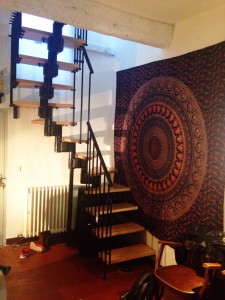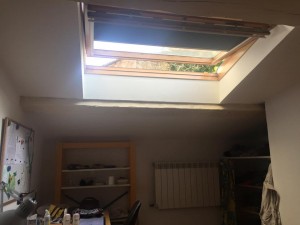The hardest decision I made in regards to studying abroad was choosing between an apartment and a homestay. Spoiler alert: I chose an apartment, though not before months of deliberation and peppering my friends who’d already studied abroad with question upon question.
In Aix-en-Provence, CEA gives you three options. You can live with a French family in a homestay, in an apartment with other CEA students, or living in a student apartment complex, Residence Mirabeau. Where you decide to live plays an extremely important role in your study abroad experience. So, here’s a little Q & A that will hopefully make the decision process a little easier.
 |
| Megan Lindemann and Anna Lavigne's gorgeous apartment. It even has a terrace! |
How independent are you?
At my home university, I lived in an apartment for two years, so I’m used to doing things on my time, in my way. I’m decent enough at feeding myself and I enjoy being able to come and go as I please. Living in a homestay, you give up a certain degree of freedom. You have to be home for nightly meals, you can’t stay out into the wee hours of the morning, and you can’t make too much noise. But at the same time, a homestay provides a familial atmosphere; many host moms do their students’ laundry, make their beds or clean their rooms. They can provide emotional support, give advice and make your welcome just that much warmer. Apartments are great for independence, but they also come with responsibilities. You have to cook and clean, and it’s hard to have your own private space. I live in a studio apartment with noisy, obnoxious neighbors and a roommate (which really isn’t too bad. I love her to death. But what if you didn’t get along as well as Reine-Marie and I do?).

How flexible are you?
Each homestay is different. You may be placed with a traditional, nuclear family with children or teens, or be placed with a single elderly grandmother. It could be in the city center, or you may have to take a twenty minute bus ride to class. Living in a homestay requires flexibility and compromise. Many homestay situations have more than one student with a family, but it’s not a guarantee, so you may be the only student in your housing. Another important aspect, often overlooked, is dietary restrictions. Do you have any food allergies? Are you vegetarian or vegan? Or are you a super picky eater? If you answered yes to any of these questions, then a homestay might not be for you. Homestays are required to meet their students’ dietary needs, but oftentimes they’re not used to doing so. As one of my friends discovered, they might be feeding you white rice and Spam every night because they’re the only things they have that are gluten-free.
How important is total language/culture immersion?
This is probably the most pertinent question. Living in a homestay provides a unique opportunity to fully experience life in a foreign country. The food, the traditions, the no-no’s, the language! If full immersion is what you’re looking for, then opt for a homestay. Of course, immersion comes with baggage. It can prove to be exhausting, confusing and frustrating at times. It can be hard if you don’t have a good grasp on the language beforehand. You want to ask your host mother for one slice of three cheese pizza but end up with three slices of one cheese. However, a homestay is by far best way to improve your language skills. A homestay can prove to be the most rewarding part of your study abroad experience. Just imagine the look on your family’s faces when you come home fluent in French or German or Spanish! You also have the opportunity to make lifelong friends with your family. They'll teach you things you can't learn in a classroom, surrounded by Americans.
 |
| A room with a view: perfect for Annie Chester, a sophomore living in a homestay. Photo courtesy of Annie Chester. |
These questions are not the only ones that should be asked. Each person wants different things out of their study abroad experience. In choosing where to live, it comes down to knowing yourself. You have to know your limitations, your expectations. To maximize your stud abroad experience, you have to choose what’s best for you. Not what your parents think is best, not what your friends did: it’s up to you.
Elizabeth Manovill is the Spring 2015 CEA MOJO Blogger in Aix-en-Provence, France. She is currently a junior at The University of Dayton.








